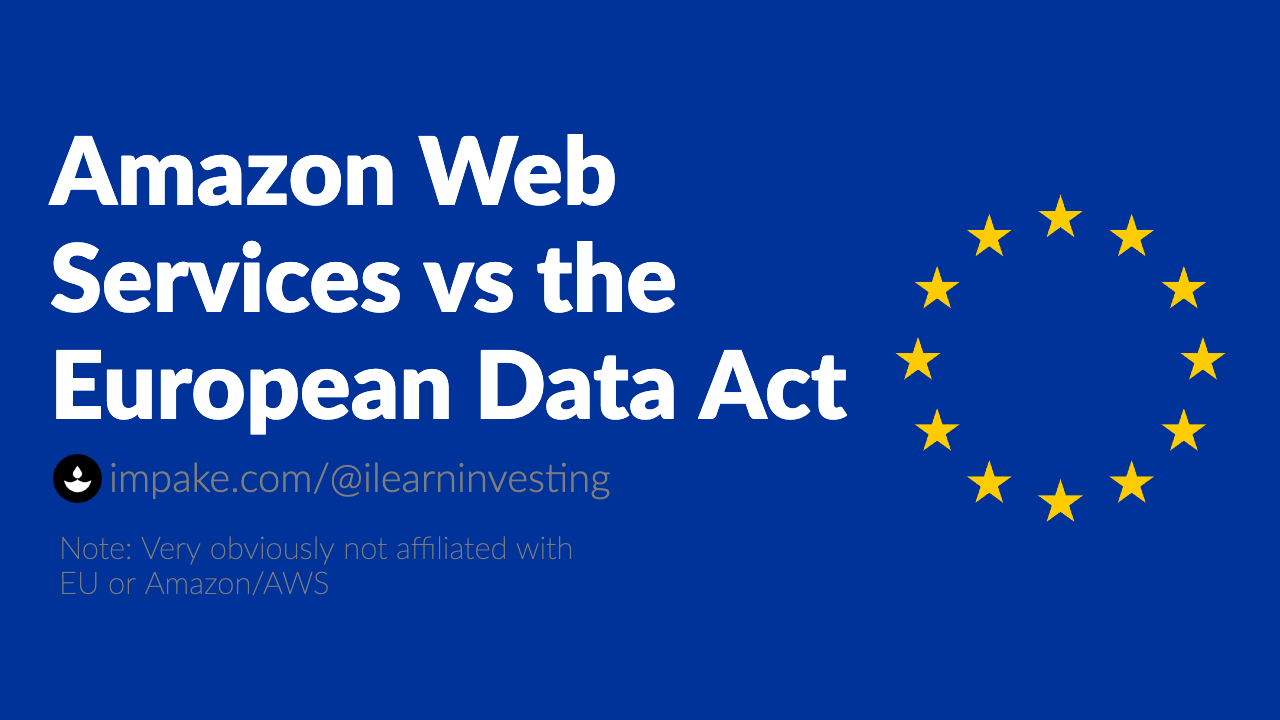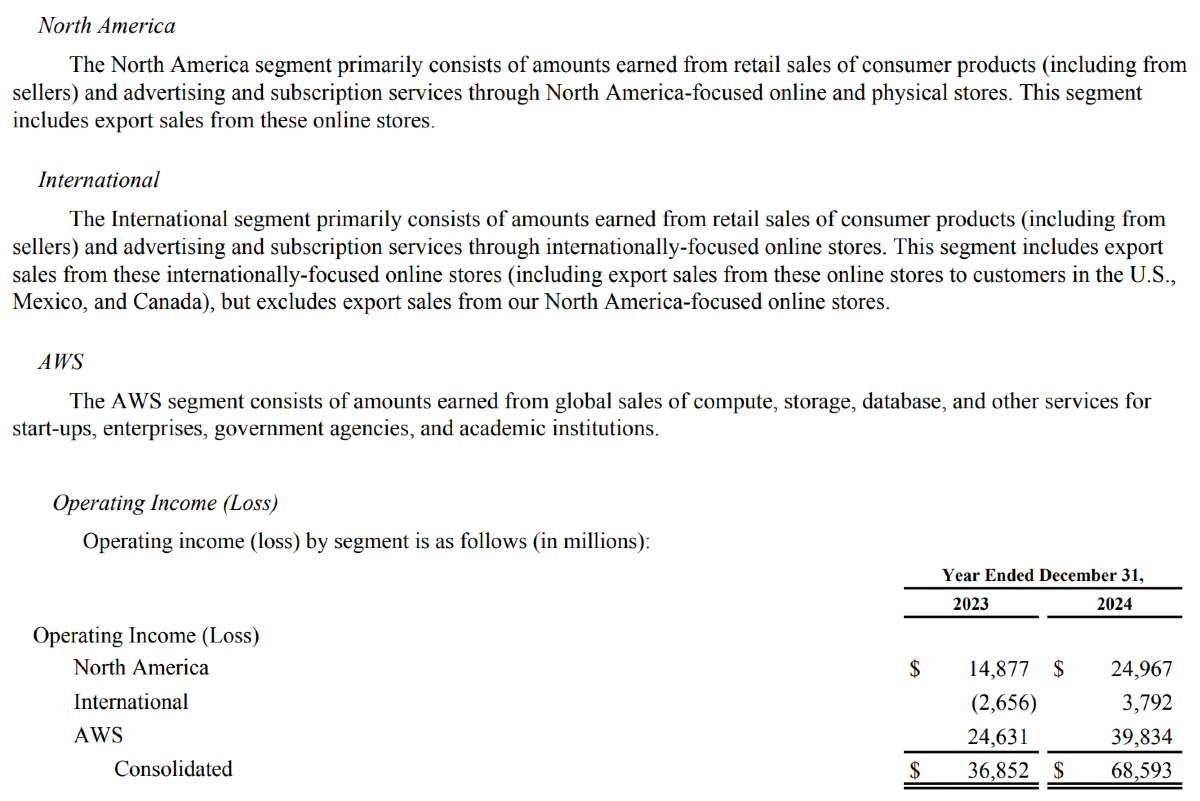
I am going to rant about Amazon in this post and will also explain how the EU Data Act (not the GDPR, this one is different) affected the switching costs of their customers, which was making their bigger customers hesitant to leave and is a big economic moat for AWS (I believe).
I tried explaining what economic moats are in my "What Is a Moat in Business" post, if you are interested click that link to open it in a new tab.
As always, before we begin, nothing you see here is financial advice and I am not a lawyer. I try learning about things then post here.
What Does EU Data Law Do?
... New rules setting the framework for customers to effectively switch between different providers of data-processing services to unlock the EU cloud market. This will also contribute to an overall framework for efficient data interoperability. ...
Read more here
Now you might be wondering, how does AWS prevent customers from leaving anyway?
They do it by charging $0.09/GB to data going out of their services (after some free allowance). That may look like a small amount to non tech people, but compared to other similar providers, their pricing is considered high. You can read this post that compares egress fees of different cloud service providers by GetDeploying.com.
After the free allowance data-transfer-out (DTO) costs reach $90/TB of data transferred.
And let me remind you, these data transfers don't just come from switching off AWS to another provider. Every image you see on a site, every bit of text you read, every video you watch, every time you stream music... Those are all DTOs.
That kind of cost is a big part of why Twitch "is not profitable," even though it's owned by Amazon. Dan (Twitch's CEO) didn't directly mention AWS in the stream where they talked about twitch, but it's probably one of the biggest costs they have.
Sure, Twitch might be valuable to Amazon in other ways, like helping to sell Prime subscriptions or supporting their broader ecosystem, but if you think of it as its own platform, like they seemed to be doing in that stream, it's not profitable on its own. And same goes for their new rival, Kick. According to Ed Craven (Kick's founder/CEO), they're not profitable either right now. This Forbes article goes into how they plan to get there eventually, not the main topic of this post, but worth a read if you're interested.
The data charges mentioned can no longer be applied the same way if the DTO is being used for switching from one cloud service provider to another.
From a KEMPITLAW.COM post:
Starting from the three years after the Data Act enters into force, CSPs [Cloud Service Providers] will no longer be able to impose any switching charges on customers. In the meantime, only reduced switching charges are allowed but cannot exceed costs incurred by CSPs in relation to the switching process.
Switching charges as in "I want to take all my things and move away from your services to your competitors', do not charge me for moving my stuff". Which may cost a lot for companies that have lots of data. We are talking petabytes of data (would be $90000/PB at Amazon's current rate of $0.09/GB after the free allowance. The free allowance depends on the service being used but it can go as low as 100GBs so not so much free there).
After the Data Act came into force Amazon had to make some changes on that charges, and published an announcement on March 5, 2024.
We believe in customer choice, including the choice to move your data out of AWS. The waiver on data transfer out to the internet charges also follows the direction set by the European Data Act and is available to all AWS customers around the world and from any AWS Region.
Oh yeah we believe in customer choice thats why we allowed you to switch freely, it also happened to align with the European Data Act. Yippee!
Oh but coincidentally, EU Data Law had come into force only about 2 months before this announcement. 👀
Oh yeah, we wanted to be nice!
They are no longer going to charge the outbound traffic of customers who are transferring their data into another cloud service.
You told us one of the primary reasons to adopt Amazon Web Services (AWS) is the broad choice of services we offer, enabling you to innovate, build, deploy, and monitor your workloads.
... We believe this choice must include the one to migrate your data to another cloud provider or on-premises. That’s why, starting today, we’re waiving data transfer out to the internet (DTO) charges when you want to move outside of AWS.
What a nice company who treats its customers right! Right? Nothing to do with any regulations coming from the EU?
Also you have to contact support for them to provide you the free DTO, which makes sense considering it is indistinguishable at the moment whether you are migrating to another cloud service provider or using their services normally.
AWS's Importance for Amazon
AWS makes 58% of Amazon's total operating income in the 2024 annual financial reports of Amazon.

Amazon is more of a cloud company than a retailer now and most people are unaware of one of their primary services, and how costly it is (now cheaper) to switch from their services into some other.
Regulations like these may damage companies' valuations, even though they generally help the customers.
This regulation for example, damages Amazon's "Switching costs" moat, considering now their bigger customers just switch services without paying the hefty monetary fees, although they still do have switching costs that are not entirely money related.
Again, you can read my post about economic moats if you are interested.
For example not all cloud service providers have APIs (code that customers need to use to communicate with their services) which can be a drop-in replacement for the existing AWS integrated code their customers have, so there would also be development costs needed to change their current code to work with their new providers' services in addition to the switching costs if there were any.
Some cloud providers do have or have started developing somewhat similar APIs though, to prevent the migration efforts from scaring away customers. (nothing new)
I also believe most small companies who are using AWS are unaware of this "Contact support to get more data transfer when moving out" right. It took me a while to find it myself. (Read that announcement linked in the beginning or Google for any recent updates, things may have changed)
End of My Rant
Anyway, thanks for reading my rant. Anything you've got to add are welcome in the comments. Have a good one!



